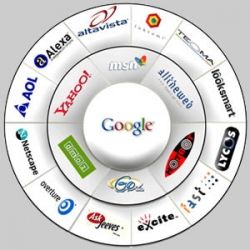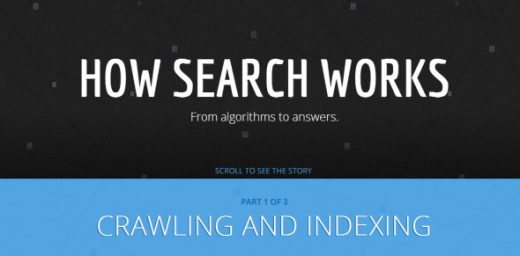- HubPages»
- Technology»
- Internet & the Web»
- Search Engines
How Google Search Engine works?

Google Web search tool is the most broadly utilized web crawler around the globe.
Have you ever supposed how it lives up to expectations? How it furnishes you the effects at such a speedier rate? From where it looks for the information? How comes about are stacked up ? This article responses these and all such inquiries..
Table of Contents:
- What is a Search Engine
- Different Search Engines
- Brief History of Google
- What Happens at point when you utilize Google Search box?
- Why Google is so Fast
What is a Search Engine?
A Search Engine is a software that is intended to explore the World Wide Web (an arrangement of interlinked hypertext records, accessed via web) to give important qualified information to the clients. This informative content may be in manifestation of a website page, a picture, a motion picture, or any viable sort of index. The programming looks for the qualified data in the gigantic information bases which are available everywhere on the globe. Measure of qualified information being imparted on the web is developing unvaryingly. Web crawlers must be effective enough to adapt to this surge of information on the web.

Different Search Engines
Why I choose Google as topic of my study?
Search enginesThe first tool to explore the web was made in 1990 and was named as "Archie". In 1991 three more inquiry systems were made in particular Gropher, Veronica and Jughead.
From 1993 and ahead the pattern of making new internet searcher was embraced . About 66 distinctive web engines have been made, out of these around the range of 42 are engaged, the rest are inactive.
The two extremely popular internet searchers in particular Yahoo and Google came into work in 1995 and 1998 respectively.
The vast majority of the web clients use Google web search tools for their search. Emulating is the report of top 5 web search tools sending the traffic worldwide:
- Google sends 90.62% of traffic.
- Yahoo! sends 3.78% of traffic.
- Bing sends 3.72% of traffic.
- Ask Jeeves sends 0.36% from traffic.
- Baidu sends 0.35% of traffic.
Brief History of Google
Google began in 1996 by Lary Page and Sergey Bin, as their exploration task. They chose to rank the sites on a foundation of another variable i.e. back-links (connects indicating from different destinations to a site). In September 1997 Google.com became a registered domain.
Emulating is a record of characteristics included in Google Web crawler:
- In 2000 Google began to utilize ads.
- Google image added in 2001.
- Google news included September 2001.
- Gmail began in 2004.
- Google Earth began in 2004.
- Google Blog began in 2005.
- Google Film began in 2006.
- Universal Search presented in 2007.
- Google Instant presented in 2010.
In 2011 and 2012 Google Panda and Google Penguin were added to evacuate the spamming and enhance the list items.
Detailed history of Google can be read from the following book:
What Happens at point when you utilize Google Search box?

The client inquiries the information from the web which is made up of 30 trillion site pages and this number is continually developing. Google navigates the web by crawling, which means it follows the links from page to page. Site possessors pick if their destinations are crawled or not.
The search is carried out via programming projects regarded as "Spiders". Spiders begin by fetching a couple of web pages , then they follow the connections on those pages and bring the pages they focus to and so on until pretty enormous lump of the web is filed i.e numerous billions of website pages that are saved over many machines.
Presently when we enter the search term in the inquiry box the programming quests the record to discover each page that incorporates those inquiry terms. There could be many conceivable outcomes. Now the inquiry rolls out how does Google know which archive we require?

This is chosen on basis of about more than 200 variables. A couple of them are recorded beneath:
- How frequently does the page holds the catchphrase(keyword)
- Do the keyword show up in the title
- Do the keyword show up in the Url
- Provided that you have entered more than one expressions then are these statements adjoining on the page
- Does the page incorporates equivalent words for those statements
- Is the page from a quality site or is it from some low ranked site.
- Is the page spam or not.
- What is the page rank of the page
- Which position is possessed by the inquiry term in the page.
There is an equation formulated by the organizers of Google Larry Page and Sergey Bin that rates a website page's importance by looking what number of outside connections focus to it, and how critical are those connections.
At long last all these(about 200) variables are consolidated to handle every page's general score and query items are indicated to you about half a second later you submit the term.
A detail of all these factors can be obtained from the following book.

Why Google is so fast?
Whenever you make the pursuit the Google web crawler does not look the whole web to furnish you the outcomes. Indeed the major part of the inquiry is already done.
Google has made distinctive databases for archiving in them diverse sorts of effects dependent upon the essential words. At the time you make a page, Google list your page and it is placed in the databases made for the expressions showing up in your web page. When you seek a term the Google only looks in the databases having the keywords as a substitute for the whole web. So you can say the effects are now stacked up in databases. At the time you enter a question, the connections from databases are demonstrated to you. Subsequently the time taken is exceptionally less. Even less than the time you take to search a record in your particular PC.








